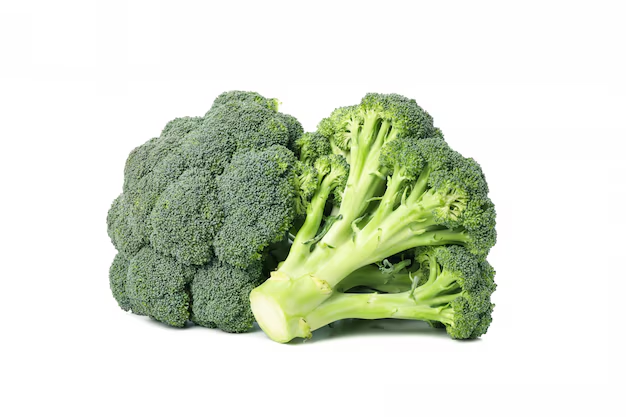Brocoli, often considered a vegetable powerhouse, has been celebrated for centuries due to its numerous health benefits. Rich in essential nutrients, antioxidants, and vitamins, it is an excellent addition to any balanced diet. This article will explore the myriad benefits of brocol’i, its nutritional profile, various ways to prepare it, and how it compares to other vegetables in terms of health advantages.
What is Brocoli?
Brocoli is a member of the cabbage family, Brassicaceae, and is closely related to cauliflower, kale, and Brussels sprouts. This green vegetable is scientifically known as Brassica oleracea var. italica and has been cultivated for thousands of years. Brocoli is native to the Mediterranean region and was first introduced to North America in the 19th century.
Brocoli features tightly clustered flower buds that form a large head or “floret,” which is the edible part of the plant. The stalk and leaves are also edible, though the florets are most commonly consumed. Brocoli can be eaten raw, steamed, roasted, or even blended into smoothies, making it a versatile food for various meal preparations.
Nutritional Benefits of Brocoli
Brocoli stands out for its impressive array of nutrients. Here’s a breakdown of what makes brocol’i such a nutrient-dense food:
1. Vitamins and Minerals
Brocoli is packed with essential vitamins and minerals that support overall health, including:
- Vitamin C: A powerful antioxidant that helps protect the body from oxidative stress, aids in collagen production, and supports immune function.
- Vitamin K: Vital for blood clotting and bone health, this vitamin is present in large amounts in brocol’i.
- Folate (Vitamin B9): Necessary for DNA synthesis and cell growth, making it especially important for pregnant women.
- Potassium: A key mineral that helps regulate blood pressure and fluid balance.
- Calcium: Brocoli contains a surprising amount of calcium, which supports strong bones and teeth.
- Iron: A mineral essential for transporting oxygen throughout the body and preventing anemia.
2. Antioxidants
Brocoli is an excellent source of antioxidants, particularly sulforaphane, which has been shown to have potent anti-inflammatory and anti-cancer properties. Additionally, brocol’i contains other antioxidants such as lutein, beta-carotene, and zeaxanthin, which support eye health and protect against age-related macular degeneration.
3. Fiber
Brocoli is a good source of dietary fiber, which is crucial for digestive health. The fiber content helps regulate bowel movements, supports a healthy gut microbiome, and can aid in managing weight by promoting feelings of fullness.
4. Low in Calories
Brocoli is naturally low in calories, making it an excellent choice for those looking to maintain or lose weight. A 100-gram serving of brocol’i contains only about 34 calories, making it a filling, nutrient-dense option that won’t derail your calorie goals.
5. Protein
Though not as high in protein as legumes or meats, brocol’i provides a surprising amount for a vegetable, offering about 2.8 grams of protein per 100 grams. This makes it a great plant-based option for vegetarians and vegans.
Health Benefits of Brocoli
Brocoli’s nutritional profile makes it a powerhouse when it comes to promoting health. Here are some of the most compelling health benefits associated with regular brocoli consumption:
1. Supports Immune Health
Brocoli’s high vitamin C content boosts the immune system by promoting the production of white blood cells. The antioxidants in brocol’i help protect the immune system from free radical damage, making it easier for the body to fight off infections and illnesses.
2. Promotes Digestive Health
With its high fiber content, brocoli plays a key role in digestive health. Fiber aids in digestion by promoting regular bowel movements and preventing constipation. Moreover, it helps maintain a healthy gut microbiome, which is critical for overall well-being.
3. Cancer Prevention
Numerous studies suggest that the compounds in brocol’i, especially sulforaphane, can help reduce the risk of various cancers. Sulforaphane has been found to inhibit the growth of cancer cells, induce cell death in abnormal cells, and prevent the spread of cancer.
4. Improves Heart Health
Brocoli is heart-healthy due to its high content of fiber, antioxidants, and anti-inflammatory compounds. The sulforaphane in brocol’i may help reduce oxidative stress and lower cholesterol levels, which in turn supports cardiovascular health. Brocoli also contains potassium, which helps maintain healthy blood pressure.
5. Supports Bone Health
Brocoli is an excellent source of vitamin K, calcium, and phosphorus, all of which are essential for maintaining strong and healthy bones. These nutrients help with bone density, reduce the risk of fractures, and prevent osteoporosis, especially in older adults.
6. Promotes Healthy Skin
The vitamin C and beta-carotene in brocol’i play a significant role in skin health. Vitamin C is necessary for collagen production, which helps maintain skin elasticity, while beta-carotene, a precursor to vitamin A, promotes healthy skin regeneration and protection from sun damage.
7. Aids Detoxification
Brocoli contains various compounds, such as glucosinolates, that support the body’s natural detoxification processes. These compounds enhance the liver’s ability to remove toxins and waste products, promoting overall health and well-being.
How to Incorporate Brocoli Into Your Diet
There are many ways to include brocol’i in your daily meals. Here are some popular methods of preparing and consuming brocoli:
- Steamed Brocoli: Steaming is one of the best methods for preserving brocoli’s nutrients. Simply steam it for a few minutes until tender and serve as a side dish.
- Roasted Brocoli: Roasting brocol’i with olive oil, garlic, and a sprinkle of salt creates a crispy and flavorful dish. Roasting enhances the vegetable’s natural sweetness.
- Brocoli Stir-Fry: Stir-fry brocoli with other vegetables, tofu, or lean protein in a hot pan with a bit of soy sauce for a quick and nutritious meal.
- Brocoli Soup: Brocoli can be blended into a creamy soup with ingredients like onions, garlic, and vegetable broth. This makes a delicious and warming meal.
- Raw Brocoli in Salads: Raw brocol’i florets can be chopped and added to salads, providing a crunchy texture and a nutrient boost.
- Smoothies: Add a handful of raw or steamed brocol’i to your favorite green smoothie for an extra dose of nutrients without compromising flavor.
Brocoli vs. Other Vegetables: A Comparison Chart
To give you a better understanding of brocoli’s nutritional profile compared to other popular vegetables, here’s a comparison chart that highlights key nutrients:
| Nutrient | Brocoli (100g) | Spinach (100g) | Carrots (100g) | Cauliflower (100g) | Kale (100g) |
|---|---|---|---|---|---|
| Calories | 34 | 23 | 41 | 25 | 49 |
| Vitamin C (mg) | 89.2 | 28.1 | 5.9 | 48.2 | 120 |
| Vitamin K (mcg) | 101.6 | 483 | 13.2 | 15.5 | 817 |
| Folate (mcg) | 63.0 | 194 | 19.0 | 57.0 | 141 |
| Calcium (mg) | 47.0 | 99.0 | 33.0 | 22.0 | 150 |
| Iron (mg) | 0.7 | 2.7 | 0.3 | 0.4 | 1.5 |
| Fiber (g) | 2.6 | 2.2 | 2.8 | 2.0 | 4.1 |
| Potassium (mg) | 316.0 | 558 | 320.0 | 299.0 | 491 |
As the chart illustrates, brocoli stands out for its combination of low calories, high vitamin C, vitamin K, and fiber content. While other vegetables like spinach and kale may offer higher levels of certain nutrients, brocol’i provides a balanced array of vitamins and minerals, making it an essential part of any healthy diet.
Conclusion
Brocoli is a nutrient-packed vegetable that offers a wealth of health benefits, from supporting immune function to promoting digestive and heart health. Its high levels of vitamins, antioxidants, and fiber make it an excellent addition to any diet. Whether eaten raw, steamed, or roasted, brocol’i is versatile and can be enjoyed in various dishes. Given its impressive nutritional profile and health benefits, it’s no wonder that brocoli is considered a superfood. Make brocol’i a staple in your diet, and you’ll reap the many benefits it has to offer.











